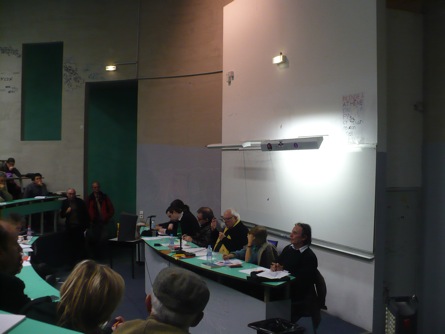Monday afternoon this week there was a big meeting in a fancy auditorium at the CRNS (National Center for Scientific Research). I say it was fancy because the audience’s chairs were padded bright red, a long coat rack held a long row of dark coats, and, unlike the plebian amphitheatres at the public universities, this room had a soft carpet. Everything was semiotically calcuated to make the afternoon’s discussion of precarity take place in an environment of visible luxury.
The occasion marked the results of a major study on precarity in French higher education and research. Precarity, needless to say, can become a contested and complicated concept, and I want to write about this too but first I need to read more of the prior literature. But the funny part, as it turns out, is that the researchers themselves seem to have faced these very same agonies of literature review and conceptual clarification; and, wanting to avoid having to settle on a single definition of precarity, they decided to let precarity be defined by the research subjects. Hence if you considered yourself precarious, you counted as such in this survey, which had 4,409 responses and appears to be a fairly representative sample of French disciplines and institutions. In practice, I venture to add, ‘precarity’ seemed to come down to a fairly straightforward matter of having a temporary, hence unstable, job situation.
The gist of the study is that precarity is rising fairly rapidly in this sector, the non-permanent workforce having for instance increased by 15.5% at the CNRS between 2006 and 2008, and university workforces currently being estimated at about 23% precarious (looking across all categories of university staff). The major findings of the report included a marked feminization of precarious jobs, a notable concentration of precarity in the social and human sciences (which Americans would call “humanities and social sciences”) in relation to the hard sciences, a definite group of young precarious workers (under 30) combined with a significant group of older “perma-temps,” a range of rather low wages (as someone put it rather sarcastically, temporary contracts are not being compensated for by better salaries), and, subjectively, a set of waves of anxiety and uncertainty about the future. As one would guess, there’s also a lot of struggling to make ends meet through multiple jobs (apparently a few even teach under assumed names, to circumvent age restrictions on some teaching assignments), a certain amount of disdain and nonrecognition from the tenured staff, and a set of inferior working conditions coupled to a lack of workplace rights in the face of the organizational hierarchy.
This has to be taken as only a quick provisional summary; the actual research report is 83 pages long, and I’ll write more about it when I’ve read it all the way through. But what I wanted to post for now was a quick translation of the political declaration announced at the end of the afternoon, after the research results were explained, after a panel of precarious workers had testified, after a distinguished roundtable had chewed things over. At the end there was a long line of academic union leaders (100% male, surely not accidentally) who sat in a row and released a joint statement. It reads as follows:
Continue reading “French press release: Putting an end to precarity”
